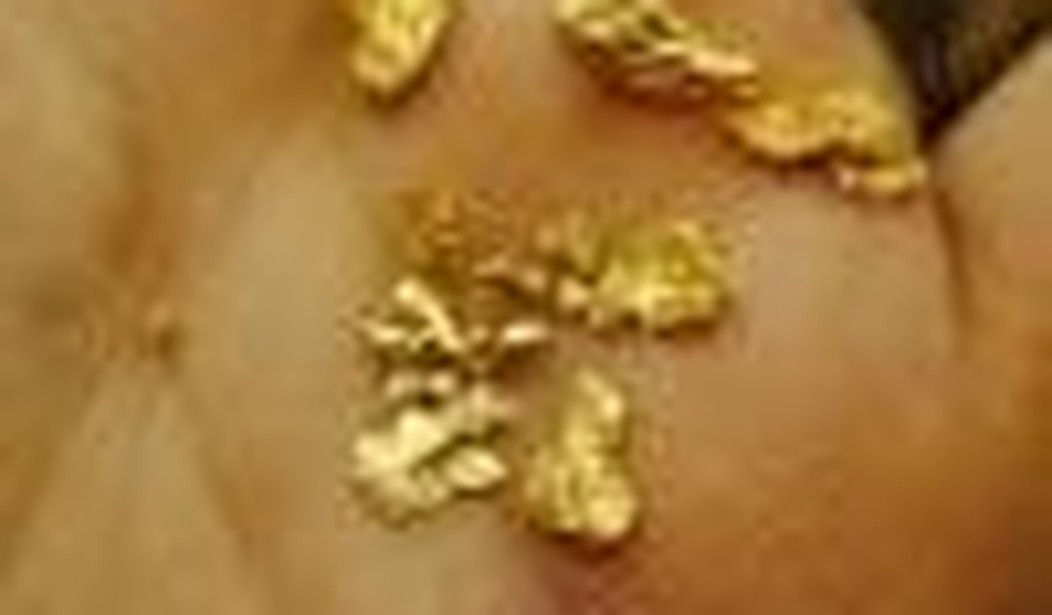Occupy Wall Street’s demands seem incoherent and childish, but one of the reasons the protesters have struck a chord with the American people is the unsavory conduct of a number of major corporations. News stories have focused on a few big financial firms, but if you want to see a venerable company in another field behaving badly, take a look at Tiffany & Co.
Tiffany has decided to curry favor with their rich and famous and largely politically correct clientele by going green in a shamelessly hypocritical way. Three and a half years ago, the upscale jewelry store chain signed on to a campaign by an obscure environmental pressure group to stop a major new copper and gold mine in Alaska.
To be fair, a lot of other jewelry retailers, including Target, WalMart, Zale, and Cartier, have also signed Earthworks’s “No Dirty Gold” petition. Most have done so because their web sites and in some cases their stores have been besieged by anti-mining activists. Signing the petition is a cheap way to earn a little green virtue.
But now Tiffany has started to put money and its public prestige into the effort to stop development of the proposed Pebble Mine, which is located two hundred miles southwest of Anchorage in the Bristol Bay area. Tiffany is one of the sponsors of a “roadshow” put on by “Save Bristol Bay.”
The roadshow consists of public screenings in six Western cities (Seattle, Portland, Corvallis, San Francisco, Santa Fe, and Denver) in October and a private screening in New York City on November 1st of a propaganda film that claims that the Pebble Mine would harm or even destroy Bristol Bay’s wild salmon fishery.
This charge would be extremely worrying if there were any chance that the mine would pollute the rivers, because the Bristol Bay watershed is the largest sockeye fishery in the world and has big runs of several other varieties of salmon. If this were 1911 or even 1961, that would be a legitimate concern. But in 2011, federal environmental controls are so strict that the water that new mines put back into rivers is cleaner than before the water was taken out of the river.
The company that is trying to develop the Pebble Mine has been preparing an application for a Clean Water Act permit for several years. So far they have spent $125 million on hundreds of environmental studies that cover every possible aspect of the mine’s potential impacts. If the Environmental Protection Agency concludes that the mine could ever pose any threat to the Bristol Bay watershed, then the permit will be denied.
That is the reality. But in this case at least, Tiffany is concerned with public relations, not reality. They have mindlessly accepted the anti-mining propaganda without any apparent concern for the facts or the damaging effects of their political advocacy. If the “No Dirty Gold” campaign succeeds, one of the largest copper and gold discoveries in the world will not be mined.
The economic loss to Alaska will be staggering. Hundreds of billions of dollars of wealth will not be created. One thousand high-paying jobs that the mine would provide for at least thirty years (and probably for several more decades) will vanish.
Of course, that would be just the beginning. If “No Dirty Gold” succeeds in blocking the Pebble Mine, then they will be in a stronger position to block other proposed mines around the country.
Tiffany doesn’t care about destroying one thousand American mining jobs. What’s a thousand jobs compared to enhancing Tiffany’s environmental image with their fashionable customers? After all, it’s unlikely that any miner will ever be able to afford a $3800 gold bangle imprinted with the Tiffany logo.
However, when their own profits are threatened, the company takes a very different position. In an official 2010 letter to the Securities and Exchange Commission, Tiffany’s general counsel objected to an obscure provision in the Dodd-Frank banking reform bill that requires the company to certify that their jewelry does not contain any gold produced in or around the Democratic Republic of the Congo.
The general counsel notes correctly that there is no way to determine where refined gold has been produced. Trying to comply with the so-called “conflict mineral” provision would be “impracticable and extremely costly.”
Rather than hypocritically trying to score points by opposing so-called “dirty gold,” Tiffany needs to clean up its own act.









Join the conversation as a VIP Member